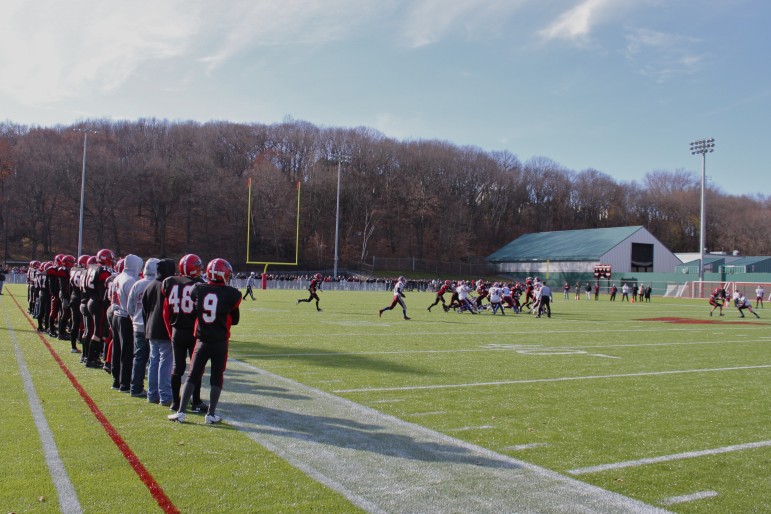
Charlie Breitrose Victory Field is home to Watertown High School’s football team, along with the field hockey, girls and boys soccer, boys and girls lacrosse, and baseball teams.
On Feb. 6, the School Committee supported the recommendation to replace the artificial turf surface at the field most used by Watertown High School’s athletic teams, however some did so with strong reservations because it would be a different type of artificial turf.
The artificial turf field at Victory Field is nearing the end of its recommended life. The City plans to replace it with another artificial turf, but with an organic material between the plastic blades of grass.
The final decision on whether to approve the project will come from the City Council, and the funding would come from the City’s budget, not the Schools.
Superintendent Dede Galdston said the current surface is aging, and athletes may have a greater chance of injury.
“At this point in time we are at the 12th full year of full use of Victory Field and we are seeing a lot of wear and tear,” Galdston said. “And there is a definite need for replacement, for a number of reasons including as the crumb rubber ages it then becomes harder and then becomes more dangerous for our student athletes. And we’ve reached that point in time.”
Galdston also said that the organic fill, made from wood particles from pine trees, reduces the temperature of the field up to 4o degrees.
Watertown resident Eileen Ryan, who founded Beyond Plastics Greater Boston, said she would like the surface to be replaced with real grass. She called the current field toxic, with the rubber fill, but she said the new one would still have toxic plastic which cannot be recycled. She added that Victory Field will still be hotter than a natural grass one.
“Plastic fields are much hotter than asphalt,” Ryan said. “They can be as hot as 200 degrees in the sun, so reducing it to 150 degrees is still unbearable and not good for our community and not good for our athletes.”
The turf replacement project, estimated to cost $1.5 million, is part of City Manager George Proakis’ Fiscal Years 2024-28 Capital Improvement Plan. The Capital Improvement Plan also includes Victory Field Phase II, which involves replacing the track, and improving the courts. The area inside the oval will remain natural grass. In addition, there is a capital item for the design of a field house at Victory Field.
The plan is to do the work over the summer, beginning after spring sports finish in mid-June, and should take about 6 weeks to complete, said WHS Athletic Director Ryan Murphy. If it is not done in time for the preseason, Murphy said he will have to find other fields in town to use in the interim.
Watertown High School teams use the turf about 800 hours a year, Galdston said, and it is also used by the Recreation Department and youth sports programs. While a new artificial turf field was built by Buckingham Browne & Nichols School (BB&N) in East Watertown, Galdston said that would not meet the needs for Watertown’s student athletes.
The new field will have a product made by BrockFILL between the blades of grass, instead of the rubber crumb fill.
“The City has also committed to replacing it with organic material, which is actually going to be from tree fibers that have been shown to be very, very good for athletes,” Galdston said. “They have committed to using that, which is a big step for the City to move away from the crumb rubber to an organic fill.”
Watertown would not be the first to use this type of fill in its artificial turf, Murphy said.
“We found Belmont and some other neighboring communities already use this surface and it has worked well for them,” Murphy said.
School Committee member Lily Rayman-Read said she has not been able to find much information about BrockFILL
“There is little research available on the safety of the material,” Rayman-Read said, adding, “What I am seeing is propaganda. I’d like to see something besides what is coming from the company.”
School Committee member David Stokes said he would support the new field because he believes sports provide a place for students to learn and succeed beyond the classroom. He worries about the plastic materials used to make the synthetic grass, and said that he has read that the technology for natural grass fields has improved and they can withstand heavy use if properly maintained.
“Our town has been a leader in other environmental endeavors and I hoped that we would also lead here, and show how it could be done,” Stokes said. “But at the moment Watertown has several athletic fields off line and with remaining resources and the age of existing turf it seems we need to take this opportunity. The public bidding has already begun, so I reluctantly vote yes for the replacement.”
The School Committee voted 6-0 to support the new artificial turf with organic fill. Rayman-Read voted “present.” See the memo provided to the School Committee on the artificial turf by clicking here.